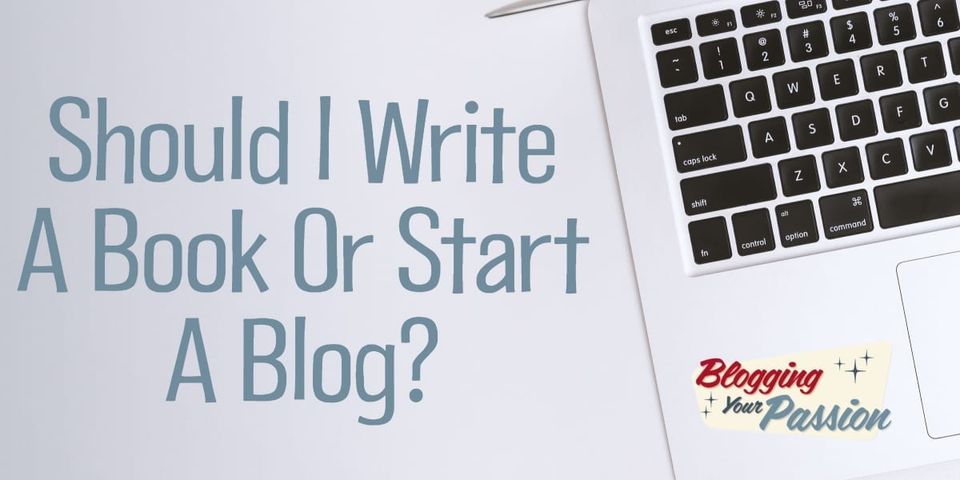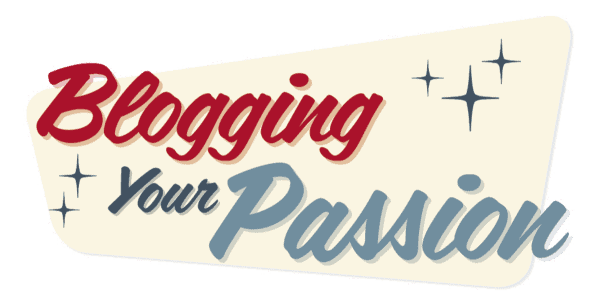Blog vs Book | Should I Write A Book Or Start A Blog?

Should I write a book or start a blog?
We recently got this question from a reader:
“Many people in my life have told me that I should write a book. It seems to be a theme! At first, I thought they were simply being kind but for some reason or another, people actually WANT to hear what I have to say and God has used the things I have written or said to encourage many believers and nonbelievers. If there are people out there who would subscribe and read… I could write for hours on end without coming up for air. All that being said, why start a blog as opposed to writing a book?“
Well, let me help you make that decision!
In this article, we'll explore the benefits and disadvantages of both options.
By the end, you'll have a clearer understanding of which path suits you best.
Let's figure out the best way to build that audience of yours!
The Benefits of Writing a Book First

Whether you write a book or start a blog, the writing process requires months of consistency. A lot of people look for shortcuts, but both of these routes require hard work over a long period of time.
A new book can take months and sometimes years to finish. Writing an entire book is a great thing, but you need to be willing to commit over the long haul.
Writing a book first can be a faster way to earn income through book sales, as readers are often more willing to pay for a book than for blog content.
Becoming a published author builds authority in your field, establishing you as an expert and enhancing your credibility.
A book is a faster way to earn income with book sales
To earn income faster, consider writing a book first and leveraging its sales potential. Writing a book can be a lucrative endeavor, especially if you manage to tap into a market hungry for your content.
Compared to starting a blog, where monetization can take time and requires building an audience, book sales can provide a more direct and immediate source of income.
With the right marketing strategy and a well-crafted book, you can attract readers and generate revenue faster.
A book helps you become a published author and builds authority
Becoming a published author establishes your authority in your field, boosting your credibility and opening doors to future opportunities.
When you write a book, you demonstrate your expertise and knowledge to others. This can greatly enhance your reputation and make you a trusted source in your industry.
As a published author, you can also receive book reviews from readers and experts, further solidifying your authority. The process of writing a book allows you to refine your writing skills and delve deeper into your subject matter.
This can provide valuable insights and perspectives that you can then incorporate into your blog content, making it more informative and engaging.
A book can become a marketing tool
Writing a good book first can transform it into a powerful marketing tool for promoting your expertise and establishing yourself as a trusted authority in your field.
Here are four reasons why writing a book can be a valuable marketing tool:
- Credibility: Publishing a book showcases your knowledge and expertise, making you stand out as a respected authority in your industry.
- Visibility: A book gives you a platform to reach a wider audience and increase your visibility. It can attract new readers, potential clients, and speaking opportunities.
- Brand building: Writing a book allows you to build your personal brand and position yourself as an expert in your niche. It helps you differentiate yourself from competitors and create a strong personal brand identity.
- Longevity: Unlike blog posts that may get lost in the vast sea of online content, a book has a longer lifespan. It can continue to generate interest and attract new readers for years to come.
A book can make an impact on others
Make a lasting impression on your readers by sharing your expertise and insights through a book.
As an author, writing a book allows you to delve deeper into your chosen topic and provide a comprehensive exploration of your ideas.
Unlike a blog, a book offers a more permanent and tangible form of expression, making it easier to leave a lasting impact on your readers.
Through your writing, you have the power to inspire, educate, and motivate others.
By sharing your unique perspective and experiences, you can create a sense of connection and belonging with your audience.
Your book has the potential to touch lives, spark conversations, and even initiate positive change.
A book can leave a legacy
If you choose to write a book, you can leave a lasting legacy by sharing your expertise and insights with a wider audience.
Here are four reasons why writing a book can help you create a meaningful and enduring impact:
- Preserving your knowledge: A book allows you to document your ideas and experiences in a comprehensive and organized manner, ensuring that your wisdom is preserved for generations to come.
- Reaching a broader audience: Unlike a blog, a book has the potential to reach a wider range of readers, providing you with the opportunity to impact and inspire a larger community with your words.
- Establishing authority: By writing a book, you position yourself as an expert in your field, gaining credibility and respect from your peers and readers.
- Leaving a tangible legacy: A book is a physical representation of your thoughts and ideas. It can be passed down through generations, leaving a tangible legacy that can inspire and educate future readers.
The Disadvantage of Writing a Book First
When considering whether to write a book or a blog, it's important to be aware of the potential disadvantages of writing a book first.
One drawback is that writing a book can be a time-consuming process, requiring a significant commitment of your energy and focus.
Traditional publishers often prefer authors who already have a platform or following, making it harder for new authors to break into the industry.
Lastly, hiring a professional editor can be costly, adding to the financial burden of self-publishing.
It can take a long time to write a book
Writing a book first can result in a significant time commitment. If you're considering writing your first book, it's important to understand that it can take a long time to complete.
Here are four reasons why writing a book can be a time-consuming process:
- Research and planning: Writing a book requires thorough research and careful planning. This can take a significant amount of time, as you need to gather information, organize your ideas, and create a solid outline.
- Writing and revising: The actual process of writing a book can be time-consuming. It takes time to write and revise each chapter, ensuring that your ideas are clear and well-organized.
- Editing and proofreading: After completing your first draft, you'll need to spend time editing and proofreading your book. This step is crucial to ensure that your writing is polished and error-free.
- Publishing and marketing: Once your book is written, there's still a long process ahead. From finding a publisher to marketing your book, these tasks can take a significant amount of time and effort.
Considering the long time commitment involved in writing a book, you may want to weigh the pros and cons before deciding whether to write your first book or start a blog.
Traditional publishers want authors with a platform
To successfully attract traditional publishers, having an established platform is crucial for authors considering writing a book first.
Traditional publishers are looking for authors who already have a following, a loyal audience that will eagerly anticipate their book. They want authors who've already built a platform through their blog or other forms of online presence.
By having a platform, authors demonstrate their ability to engage with readers, showcase their writing skills, and prove that there's a demand for their work.
Without a platform, it can be challenging to convince traditional publishers to take a chance on your book.
A professional editor can be expensive
If you're considering writing a book first, be aware that hiring a professional editor can often be an expensive investment. While writing a book can be a fulfilling endeavor, it's important to weigh the costs involved.
Here are four things to consider:
- Budget constraints: Professional editors usually charge by the hour or project, and their rates can vary significantly. It's crucial to assess whether you have the financial means to hire an editor before committing to writing a book.
- Quality assurance: An editor plays a vital role in ensuring your book is polished and error-free. While self-editing is an option, a professional editor brings expertise and objectivity to the process, resulting in a higher-quality final product.
- Time commitment: Collaborating with an editor requires time and coordination. If you have a tight schedule or prefer a faster publishing process, writing a blog may be a more practical option.
- Return on investment: Consider the potential returns on your investment in hiring a professional editor. Will the book generate enough sales to justify the expenses? Assess the market demand and evaluate if writing a book is the best choice for you.
Ultimately, the decision to write a book or a blog depends on your goals, resources, and personal preferences. Weigh the advantages and disadvantages carefully before making a choice that aligns with your aspirations.
The Benefits of Blogging First

If you're considering whether to write a book or a blog, starting with blogging first can have several benefits.
It can make you a better writer by allowing you to practice and refine your writing skills.
Blogging can create an audience for your books, as readers who enjoy your blog may be more likely to support your book projects.
A blog makes you a better writer
Writing a blog first can greatly improve your writing skills. Not only does it provide a platform for self-expression, but it also offers numerous benefits that can make you a better writer. Here are four reasons why starting with a blog can enhance your writing abilities:
- Practice makes perfect: By regularly writing and publishing blog posts, you develop discipline and consistency in your writing routine, which ultimately strengthens your skills.
- Feedback and interaction: Blogs allow for immediate feedback from readers, helping you understand what resonates with your audience and what areas you can improve upon.
- Experimentation: Blogging gives you the freedom to explore different writing styles, topics, and formats, allowing you to discover your unique voice and hone your craft.
- Building a community: Engaging with your readers and fellow bloggers fosters a sense of belonging, encouraging you to continue writing and improving your skills.
A blog creates an audience for your books
To create an audience for your books, start by blogging. This is a great way to connect with book bloggers and build a loyal following. By sharing your writing on a blog, you can attract readers who are interested in your genre or writing style.
Engage with your audience by responding to comments and creating a sense of belonging. Building an email list is another effective strategy to reach potential readers. You can offer exclusive content or sneak peeks of your upcoming self-published books to encourage sign-ups.
Through blogging, you can establish yourself in the publishing world and showcase your writing skills. So, don't hesitate to start a blog and create an audience for your books.
A blog allows you to test out your ideas
How can you determine if your ideas are worth writing a book or starting a blog? One way to test out your ideas is by starting a blog.
Here are four reasons why blogging can be beneficial:
- Immediate feedback: Blogging allows you to share your ideas with an audience and receive instant feedback. This feedback can help you refine your ideas and gauge their potential.
- Building an audience: Through blogging, you can attract readers who are interested in your niche or topic. This audience can provide valuable insights and serve as a foundation for future book readership.
- Developing your writing skills: Writing blog posts regularly helps you hone your writing skills and find your unique voice. This practice will be invaluable when it comes to writing a book.
- Testing the market: Blogging gives you the opportunity to test the market and see if there's an audience for your ideas. If your blog generates a positive response, it may indicate that there's a demand for your book as well.
A blog can attract a book deal
Starting a blog can attract a significant number of book deals. By establishing yourself as a knowledgeable and engaging writer on a specific topic, you can catch the attention of publishers and literary agents.
Blogging provides a platform to showcase your writing skills, build a loyal audience, and prove your expertise in your chosen field. Through consistent and high-quality blog writing, you can create a portfolio of work that demonstrates your unique voice and perspective.
Publishers often seek out bloggers with a strong following and compelling content, as they already have an established audience to market their book to.
Having your own book blog allows you to interact directly with readers and receive feedback, which can be invaluable when it comes to refining your ideas and writing style.
A blog helps you build an email list
By blogging first, you can actively engage with your audience and cultivate a valuable email list. Building an email list is essential for creating a loyal community of readers who are interested in your content.
Here's how blogging can help you build an email list:
- Capture reader's attention: With a compelling blog post, you can entice readers to subscribe to your email list for more valuable content.
- Provide exclusive content: Offer exclusive articles or downloadable resources to your email subscribers, giving them a reason to join your list.
- Foster a sense of belonging: By sending regular emails, you can create a sense of community and make your readers feel like they're part of something special.
- Drive traffic to your blog: Email marketing allows you to direct your subscribers back to your blog, increasing your website traffic and engagement.
The Disadvantages of Blogging First
When considering the disadvantages of blogging first, there are a few key points to keep in mind.
It can take a while for your blog content to rank in search engines, meaning it may take longer to gain visibility and attract readers.
Search engine optimization (SEO) is a technical skill that you'll need to learn in order to optimize your blog for search engines.
Lastly, blogging can be hard work, requiring consistent effort and dedication to produce valuable content and engage with your audience.
Blog content can take awhile to rank in search engines
Writing a blog before a book can result in the disadvantage of waiting for your blog content to rank in search engines. This means that even though you may have created valuable and relevant content, it may take some time for it to be recognized and appear in search engine results.
Here are four reasons why blog content can take a while to rank in search engines:
- Competition: There's a vast amount of content being published daily, making it harder for your blog to stand out and rank higher.
- Algorithm Updates: Search engines constantly update their algorithms, making it necessary for your blog to adapt and meet new requirements.
- Domain Authority: New blogs typically have lower domain authority, which affects their ranking potential.
- Time and Consistency: It takes time to build up your blog's reputation and authority. Consistently publishing high-quality content will help improve your chances of ranking higher.
While blogging can be a great way to share your thoughts and expertise, it's important to consider the potential delay in ranking your blog content in search engines.
Search engine optimization is a technical skill to learn
To effectively rank your blog content in search engines, you'll need to learn the technical skill of search engine optimization. It may sound daunting at first, but don't worry, you can learn it!
Search engine optimization (SEO) is the process of optimizing your website and its content in order to increase its visibility and ranking on search engine results pages.
By understanding SEO, you can improve your chances of attracting more organic traffic to your blog and reaching a larger audience.
Learning this technical skill will require time and effort, but the rewards are worth it. With SEO knowledge, you can enhance your blog's visibility, increase its chances of being found by potential readers, and ultimately boost your online presence.
Blogging can be hard work
Despite the challenges, blogging can be a rewarding and fulfilling endeavor. However, it's important to acknowledge that blogging can be hard work. Here are some of the disadvantages you may encounter along the way:
- Time-consuming: Building a successful blog requires consistent effort and dedication. It can be time-consuming to create quality content, engage with readers, and promote your blog on various platforms.
- Content creation pressure: Coming up with fresh and engaging content regularly can be challenging. You need to be creative, knowledgeable, and original to keep your readers interested.
- Technical aspects: Setting up and maintaining a blog involves dealing with technical aspects like website design, hosting, and search engine optimization. Learning these skills can be overwhelming, especially for beginners.
- Monetization struggles: While blogging can be a great way to make money, it's not always easy. Building a loyal audience and finding profitable opportunities can take time and effort.
FAQs on Should You Write a Book or Start a Blog?
What are some pros of writing a book?
Writing a book allows you to go in-depth on a subject area and establish yourself as an expert. Books also tend to have more perceived authority and status than blogs. However, writing a book takes a lot more time and work upfront before you see any money from sales.
What are some cons of writing a book?
Writing a book takes a lot of time - most nonfiction books take 1-2 years. There is no guarantee of a publishing deal or sales. You also have less creative control compared to self-publishing. However, getting a traditional publishing deal does provide marketing support.
What are some pros of starting a blog?
Starting a blog is much faster and easier than writing a book. You can publish articles frequently on many topics. Blogs allow you to connect with readers and get real-time feedback. They can also generate income through ads, affiliates, products, etc.
What are some cons of blogging?
It takes time to build traffic and authority. Income potential is lower per piece of content. Your content is not as organized around a single topic. However, you have more flexibility than book writing.
How much time does blogging take compared to writing a book?
Writing a long-form nonfiction book takes at least 12-18 months for most writers. Blogging can take as little as 1-2 hours per week for a simple blog. The time investment is much lower compared to book writing.
What topics are best for each format?
Books suit big concepts you want to be seen as an expert on. Blogs work well for tips, commentary, tutorials, analysis - content published more frequently. Timeless evergreen topics also work better for books.
Can I make money from books and blogging?
Yes, both can generate income long-term. However, blogging tends to provide income faster. With books, you need to finish the full project first. Top bloggers make 5-6 figures but average books earn ~$5,000.
What should I focus on as a new writer?
The easiest approach is to start a blog first. This lets you build an audience and get feedback. Once your blog is successful, you can use that platform to launch a book. Having an existing audience makes publishing much easier.
Final Thoughts
Deciding whether to write a book or start a blog can seem like a big decision for any writer hoping to share their work and ideas.
While writing a comprehensive book may seem like the best thing for establishing yourself as an expert, the time commitment involved is extensive.
On the other hand, starting a blog provides a much easier way to begin creating content and connecting with readers in the short term.
When getting started, the first step is simply to begin writing consistently - whether you are working on book chapters and ideas or creating blog articles and videos.
As many famous authors emphasize, a little bit of writing each day adds up over the long term. While a book may take over a year to complete, a blog can be launched in a matter of weeks.
This allows you to start generating affiliate marketing income, selling ebooks, and building mailing lists much faster.
At the end of the day, every writer needs to find the format that aligns with their primary goal and the kind of work they hope to produce.
If developing in-depth expertise on a particular subject is most important, writing a book may be the best path forward. But blogging provides much more flexibility for sharing tips, stories, and advice on a regular basis.
The easiest way for new writers to get started is often through blogging while working slowly on book ideas over time.
Regardless of which format you choose, the most important thing is to simply start writing consistently. Over the long term, regular work and dedication is what separates the famous authors from the rest.
